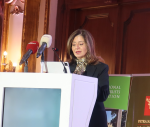You are here
Testing Obama
Mar 04,2014 - Last updated at Mar 04,2014
The crisis between the West and Russia over recent events in Ukraine has become the central issue in international politics, replacing Syria and overshadowing others, such as Iran’s nuclear talks and the Mideast peace process.
The swift military intervention by Russia in Crimea, an autonomous republic that is territorially part of Ukraine, has heightened tensions between Washington and its European allies, and Moscow.
US Secretary of State John Kerry has likened Russia’s “incredible aggression” on Ukraine to a 19th century invasion. The US has threatened Russia with economic sanctions and international isolation.
Already international markets are jittery, while big losses to the Russian ruble have forced Moscow’s central bank to intervene. A trade war would hurt all sides.
Moscow was taken aback last week when its ally, President Victor Yanukovych, was forced to flee the country a day after he signed an agreement, sponsored by the EU, with the opposition that called for early presidential elections, among others.
He was replaced by an interim president and is now wanted for committing murder against protesters in Kiev.
The new government, supported by the West, has mobilised troops in reaction to what it described as Russia’s “declaration of war”.
The crisis has resurrected the spectre of Cold War confrontations and underlined President Vladimir Putin’s ambitions to demonstrate Russia’s resurgence as a superpower.
Russia says it is acting to protect its nationals in Crimea, which is host to Moscow’s Black Sea fleet. It is not clear if a repetition of the Georgia conflict of 2008 is about to happen.
The eastern provinces of Ukraine have a majority of Russian-speaking nationals who are sympathetic to Moscow. If the Kremlin decides to intervene there, its forces are expected to overrun the region in a matter of days.
This is undoubtedly the biggest geopolitical challenge that Barack Obama faces as president.
There is little that Washington can do militarily to stop Russian tanks from taking over large chunks of Ukraine.
The US has threatened economic war and diplomatic isolation, but Putin is unlikely to change his stand as a result, at least not on Crimea, for now. Moscow has agreed to leave the door open to dialogue.
The Europeans have suggested mediation to resolve the Ukraine issue. But Russian Prime Minister Dmitry Medvedev condemned the seizure of power in Ukraine and predicted that the rule of the new leaders would end with “a new revolution [and] new bloodshed”.
He maintained that Yanukovych, who is now in Russia, remains the legitimate president of Ukraine.
Resolving the current crisis will not be easy. Diplomatic efforts will have to focus on convincing the Russians not to escalate the situation any further.
So far, Putin bolstered his image as Russia’s strongman while Obama is being criticised at home for his failure to act on Syria, for reaching a shadowy deal with Iran and now for Ukraine.
Unlike Syria, the international community will not be able to take the Ukraine case to the UN Security Council. This problem will require high-level engagement between Obama and Putin. Even the Europeans will carry little weight on this issue.
Ironically, it is Obama who now finds himself under pressure.
As the leader of the free world, whose country, along with the Europeans, has backed mass anti-government demonstrations in Kiev’s Independence Square for weeks, he is now forced to act tough.
The new leadership in Ukraine has pinned its hopes on the West. Its economy is in tatters and it is in urgent need of help.
It is possible that Obama’s foreign policy, which has often been criticised for lacking courage and determination, will disappoint the people of Ukraine.
The US president’s poor style of leadership was demonstrated on a number of occasions: on peace talks between Israel and the Palestinians during Obama’s first term, on Afghanistan, where lack of trust between President Hamid Karzai and the US president was responsible for postponing the signing of a strategic treaty, on Iraq, where the US allowed authoritarian Prime Minister Nouri Al Maliki to wage sectarian war while cooperating closely with Iran, and finally on Syria, where Obama’s red lines have been crossed so many times by the Syrian regime while the White House appeared indecisive on how to support the opposition.
On the other hand, Putin has stood his ground on Syria, allowing a ruthless regime to bomb civilians and commit atrocities for more than three years.
Moscow brushed aside criticisms of its human rights record while tightening its grip over rebellious republics within its strategic sphere of influence.
It is clear that the West has miscalculated in Ukraine, which has great geopolitical importance to Moscow. The Russians have always been suspicious of Western moves to bolster influence along its eastern borders in Europe.
The link between Syria and Ukraine is unmistakable, but it is not clear how one crisis can affect the other.
It is possible that Moscow could “soften” its position on Syria in return for having its way in Crimea, while allowing diplomacy to work things out with the interim leadership in Kiev.
But it is also possible that Moscow would “harden” its stance on Syria in retaliation for Western meddling in its own backyard.
Obama, who is said to be reviewing his options on Syria, may adopt a military solution that aims at weakening Russia’s Syrian ally, including launching missile attacks and arming the rebels with quality weapons.
A Western onslaught on Syria may drive Putin to negotiate a deal on both issues.
Either way, the White House is facing a unique crisis in Ukraine, one that it has helped create. It could prove to be Obama’s biggest foreign policy test yet
The writer is a journalist and political commentator based in Amman.












